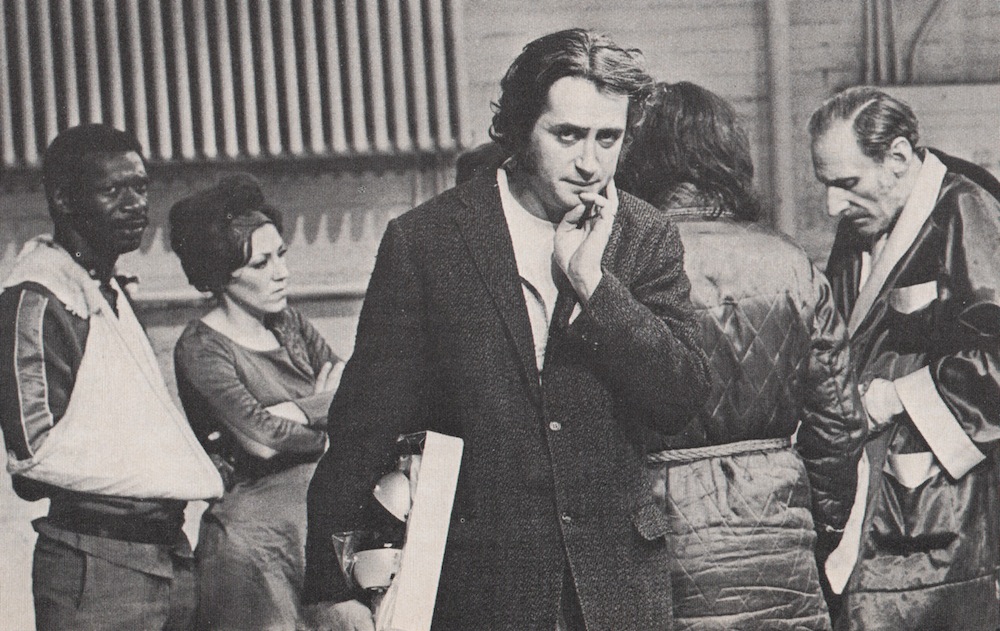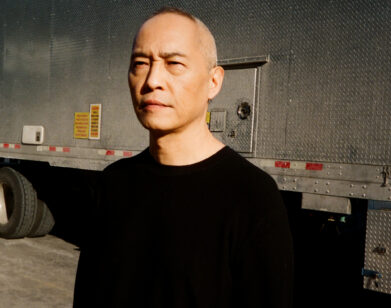Six Decades of Robert Downey Sr
Korean War veteran, off-Broadway playwright, cult counterculture filmmaker, documentary director, boxing champion, minor league baseball player, bit-part actor, Paul Thomas Anderson and Louis C.K. favorite, and father of one of today’s highest-paid actors—Robert Downey Sr. has held many titles over the last 60 years. Now 78, Downey Sr. is the subject of “Truth and Soul, Inc.: The Films of Robert Downey Sr,” a fundraising retrospective organized by The Cinefamily in Los Angeles, California. Although the retrospective officially ends tonight, Downey’s films will play at Cinefamily throughout the month of December.
Here, Downey Sr. reflects on his multi-faceted career.
KALEEM AFTAB: I recently watched Putney Swope (1969) for the first time. It was very prescient. Can you give me any recollections?
ROBERT DOWNEY SR: I had a great time doing it, [but] big trouble when it was done—nobody wanted it. My earlier films had showings at the Bleecker Street Cinema [in New York] and the Gate Cinema. This next film was one that I thought would be easily shown somewhere and nobody wanted it. The guy who backed it knew somebody who knew a guy who owned all the theaters in New York and was also a distributor. He arranged for a screening—one last chance. The guy, Don Rugoff, came, and he said, “I don’t get it—I like it. Let’s open it.” About a month later the film was open on 3rd Avenue and people started coming. Then, on The Tonight Show, if you can go back that far, Jane Fonda was on—she was talking about Easy Rider and she mentioned Putney Swope as a film that people should see. The next day the box office went up everywhere and the film was a success.
AFTAB: Thank God for Jane Fonda.
DOWNEY SR: I don’t know her.
AFTAB: There’s a great line at the start of the film: “Beer is for men who doubt their masculinity. That’s why it’s so popular at sporting events and poker games.”
DOWNEY, SR: I think it’s true, still. And I’m a sports fan.
AFTAB: Is that because you don’t drink beer or question your masculinity?
DOWNEY SR: Both. Like everybody, I guess.
AFTAB: You were a playwright and a boxer. Can you tell me a bit about your boxing past?
DOWNEY SR: Golden Gloves. I’m a boxing fan. I went in without training and I was tall for my weight.
AFTAB: What weight were you?
DOWNEY SR: 149 [pounds] and I’m 6’3″. I had a good jab and could keep somebody away from me, but I didn’t train. The first fight I had, there was a guy who trained less than me, I think. I hit him with a couple of shots and he went down. I won. I couldn’t believe it. I was on the subway heading home and down at the end of the subway car was this guy that I’d just fought. He was looking at me, and I was looking at him, and I thought he was going to kill me. I was so paranoid. We kind of waved to each other as I got off. The next fight, I fought a guy who knew what he was doing and I lost. I didn’t get hurt, but he definitely outpointed me. That was the end of the gloves, but at least I got one in.
AFTAB: What made you want to step in the ring?
DOWNEY SR: I loved boxing. I just wanted to give it a try.
AFTAB: What made you want to get into writing, was it your mother?
DOWNEY SR: No, no. I was in a stockade in the army and the guy who ran the stockade said something like, “Here is a notebook. Maybe you can write something and amuse yourself when you are not working.” In the stockade, you usually work all day–lifting rocks, putting them on the truck, taking them off—that kind of stuff. I started scribbling and it felt right.
I wrote a few plays. They were done Off-off-off-off Broadway. I was working as a waiter at the Village Gate in Greenwich Village and the other waiter said, “I have a camera. Do you have anything written that we can make into a movie?” We went with his camera, my script, rounded up some people, and made a film. [I] couldn’t believe it. We actually had fun.
AFTAB: What did it mean to you to be seen as part of “counterculture”? Was that something you believed?
DOWNEY SR: I never thought of it that way, but I guess it’s true. I read that. I loved reading when the critics in New York would say that some of my films reminded them of Lenny Bruce. That was interesting for me. Whether it’s because there were some four-letter words in the films, or the sensibility, I don’t know, but it’s fun to read that.
AFTAB: Did you know Lenny Bruce?
DOWNEY SR: I saw him perform at the Village Vanguard and there was nothing like it.
AFTAB: Let’s talk about Greaser’s Palace (1972) and the outrage it created with its depiction of a modern day Christ.
DOWNEY SR: I wanted to try something different. All I can tell you is that when that film was in the theater somebody ran out—I guess because they were offended by the film—and got hit by a cab. It was not fun to hear that one. They didn’t die, but they got hit.
AFTAB: What made you want to make that film, was it to talk about religion?
DOWNEY SR: [A woman] told me that I could write whatever I wanted and if she liked it, she would see if her husband would agree to finance it. She liked it. He asked me if it was going to make money, and I said absolutely not. He said, “that’s charming,” and somehow we got the money together and we made the film. She’s responsible for that.
AFTAB: You’ve done some acting roles.
DOWNEY SR: I’m not an actor. I can show up for friends and improvise a little bit, but I’m not an actor. I can’t remember lines.
AFTAB: You’ve shown up in a lot of Paul Thomas Anderson films. How did that friendship develop?
DOWNEY SR: I would show up any time he asked me. It was a woman in Los Angeles who told me that she had a great script for me to read, and the last thing I wanted to do was read another script, including my own. I was having a good time out there, [but] she kept bothering me. [I read it] and it was terrific. I couldn’t’ believe it. It was called Sidney by Paul Thomas Anderson; it ended up being called Hard Eight. I met with him and he knew my stuff. He was so young—he knows everything. We’ve been friends ever since. I love what he does.
AFTAB: You put your son, Robert Downey, Jr., in his first few roles. Can you tell me a bit about him developing as an actor?
DOWNEY SR: I think the first time was in Pound (1970), when he played a puppy that got adopted right away. Everybody played dogs and he, because he was so young, couldn’t be in the whole film. He was so great and we were wondering, “How could he be so good without ever having done this before?” I think we couldn’t afford a babysitter for that first day and so we got him.
AFTAB: You put him together in a film with Sean Penn, Hugo Pool (1997).
DOWNEY SR: Yeah. That is one of my films that I’m not so happy with, but Robert is amazing. Everybody knows his story. He’s a funny gentleman and that he overcame what he overcame is beyond a miracle. It was overwhelming to see. And how he carries himself now–he is a great painter, a great father. He’s just a sweet character.
AFTAB: Did your disappointment with Hugo Pool push you to stop making fiction films?
DOWNEY SR: No. I would have loved to have done another one. There is an editor I work with who says every film is too long, and I think that film is too.
AFTAB: Are you very critical of your own work?
DOWNEY SR: I am now.
AFTAB: What’s changed about your sensibility?
DOWNEY SR: I think the world is in a tougher place. I don’t know what my sensibility is—I’m nervous about it.
AFTAB: Do you think it’s scarier now than it was when you were making these films in the 1960s and 1970s?
DOWNEY SR: By 100 times.
AFTAB: In what way?
DOWNEY SR: Tell me a country that is doing well and has a great leader? You look at the nuclear weapons all over the place and you look at things like ISIS, and every country seems to have a battle going on. This is not leading to a good conclusion, unless the world wakes up. This is not what I was living through 50 years ago.
AFTAB: What was it like doing a cameo with your son in Hail Caesar (1994)?
DOWNEY SR: I forgot about that. I just know that Samuel Jackson was watering the lawn in that film—he was a gardener—and nobody knew who he was. That was fun, to see this very quiet guy, and the next thing you know he’s Sam Jackson. And Anthony Michael Hall did a pretty good job.
AFTAB: Was he a friend of Robert’s?
DOWNEY SR: I think so. They were friendly because they were both on SNL together.
AFTAB: How do you feel about Robert being Iron Man?
DOWNEY SR: Well, actually that film is about something. It’s about a guy who wants to give up selling military hardware, so it’s not just an action film. It’s got a sense of humor about it. That’s the first one. The second and third one are not up to that. Tropic Thunder is up to it—it’s a film that every time you see it, you get a different kind of laugh.
AFTAB: What are some of your favorite contemporary films?
DOWNEY SR: I think Rust and Bone (2012) is a great film.
AFTAB: I preferred Audiard’s previous film, A Prophet (2009).
DOWNEY SR: I liked that, but Rust and Bone, to me, was a great, great, great, achievement. It’s a love story, but it’s brutal. I thought [Marion Cotillard] was great and the guy was great. It was just a great film to me. How about when the kid goes down the ice? My, god.
TRUTH AND SOUL, INC: THE FILMS OF ROBERT DOWNEY SR ENDS TONIGHT AT THE CINEFAMILY IN LOS ANGELES. DOWNEY’S FILMS WILL CONTINUE TO PLAY AT CINEFAMILY THOUGHOUT THE MONTH OF DECEMBER. FOR MORE INFORMATION, VISIT THE CINEFAMILY WEBSITE.







